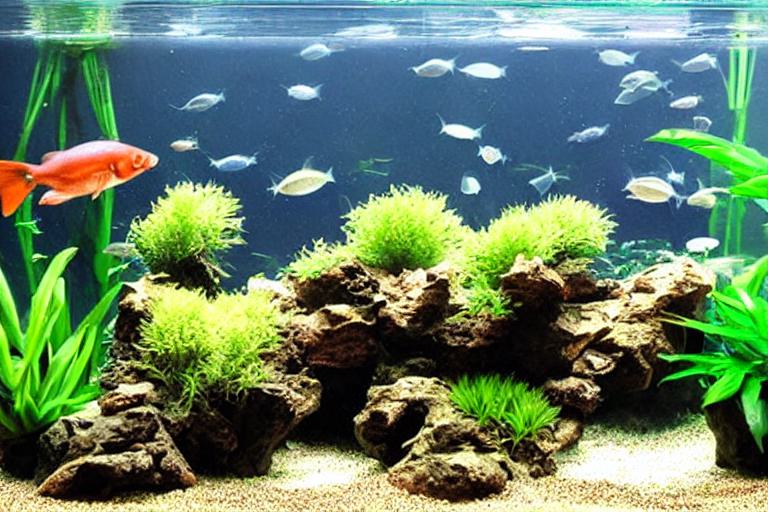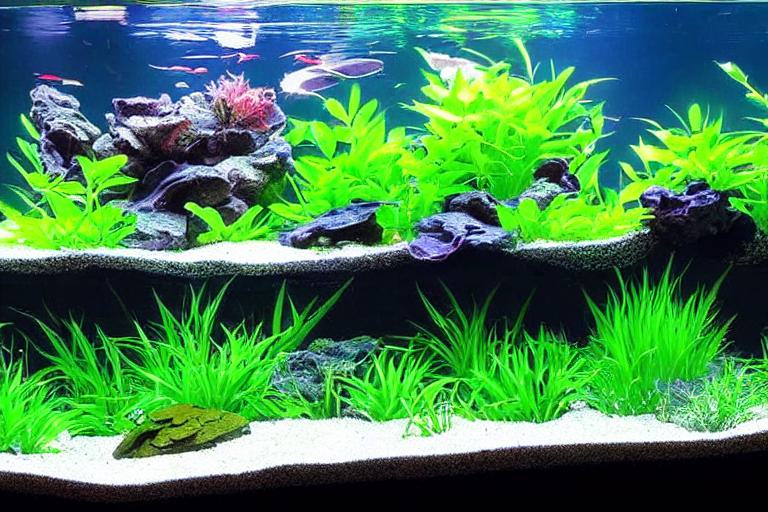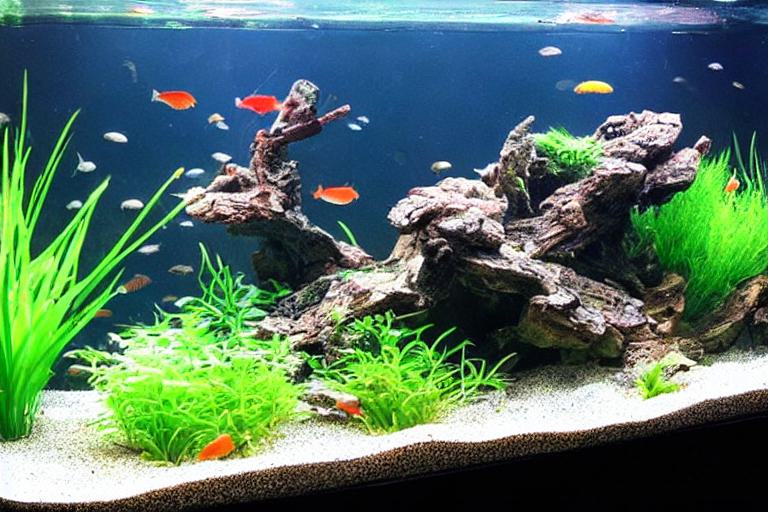Aquarium plants are a beautiful and popular addition to many fish tanks, but did you know that they can actually be dangerous to your fish? That’s right, some aquarium plants can release toxins that can kill fish, and in some cases, even humans. So, what are the risks and how can you prevent your fish from being harmed?

Ich and Aquarium Plants
The parasites reproduce on the fish’s body and release their offspring into the water, where they can infect other fish. It is caused by a parasitic protozoan that infects the fish’s skin and scales. Ich, also known as white spot disease, is a common ailment in aquarium fish.
The parasites can attach to the plants and be transferred to other fish when they brush against the plants. In addition, the parasites can fall off the fish and onto the plants, where they can survive for several days. Aquarium plants can play a role in the spread of ich.
This will help to prevent the parasites from attaching to the plants. First, quarantine new fish for at least two weeks before adding them to your tank. Finally, consider treating your fish with a medication that is effective against ich. There are a few things you can do to prevent ich in your aquarium. This will give you time to observe them for any signs of disease. Second, keep your aquarium clean and free of debris.
Getting Rid of Plant Ich
Plant ich, or Cryptocaryon irritans, is a parasitic infection that can be deadly to fish. Plants are a great addition to any aquarium, but they can also pose a serious threat to your fish. This disease is often spread through infected plants, so it’s important to be careful when adding new plants to your tank.
First, quarantine any new plants before adding them to your tank. Second, disinfect all new plants before adding them to your aquarium. This can be done by soaking them in a bleach solution for 10 minutes. There are a few things you can do to prevent plant ich from infecting your fish. Finally, avoid adding plants that have been in contact with infected fish. This will give you a chance to observe them for any signs of disease.
If your fish do become infected with plant ich, there are a few treatment options available. One option is to remove all plants from the tank and treat the fish with a commercial ich medication. Another option is to raise the temperature of the tank to 86 degrees Fahrenheit, which will kill the parasites.
Quarantining new plants and disinfecting them before adding them to your tank is the best way to prevent the disease from spreading. Plant ich can be a serious threat to your fish, but there are a few things you can do to prevent it. If your fish do become infected, there are a few treatment options available.
Plant Rot and Ammonia
Ammonia levels can rise quickly in an aquarium, and it can be very difficult to remove all of the ammonia from the water. Ammonia is one of the main causes of plant rot, and it can be produced by decomposing plants and fish waste. Plant rot is a serious problem that can kill fish in an aquarium.
Remove all of the plants from the aquarium and clean the tank thoroughly. You may also need to remove all of the fish from the tank and treat them with a medication that will remove the ammonia from their bodies. If you think that your fish may be suffering from plant rot, it is important to take action immediately.
Which Plants are Suitable for Aquariums
When it comes to plants and aquariums, there are a few things to consider. Some plants can release toxins that can be harmful, or even fatal, to fish. First and foremost, you want to make sure that the plants you select are safe for your fish.
These plants are all relatively easy to care for and can provide your fish with some much-needed hiding places. That being said, there are still plenty of plants that are safe for aquariums. Some popular options include Java fern, Anubias, and Hornwort.
But with so many safe and beautiful options available, there’s no reason not to add some plants to your fish’s home. When choosing plants for your aquarium, it’s important to do your research to make sure they are safe for your fish.

Overgrowth and over-planting your tank
But one of the most important things to keep in mind is not to overdo it with the plants. If you’ve ever had an aquarium, you know that they can be a lot of work.
While it might seem like a good idea to have a lot of plants, it can actually be very dangerous for your fish. Overgrowth and over-planting can lead to a number of problems, including:
• Oxygen depletion: Too many plants can consume all of the oxygen in the water, leaving your fish gasping for air.
• Ammonia poisoning: Ammonia is produced by decomposing plant matter, and it can be very toxic to fish.
• Nitrate poisoning: Nitrates are another byproduct of decomposing plants, and they can also be poisonous to fish.
This can suffocate your fish and make the water unsafe to swim in. • Algae blooms: Algae thrive in nutrient-rich environments, so an overabundance of plants can lead to an algae bloom.
To avoid these problems, it’s important to carefully consider the number of plants you put in your aquarium. Make sure you have enough space for them to grow, and don’t overcrowd the tank.
There are a few things you can do to fix the problem, including: If you do find yourself with an overgrown tank, don’t despair.
• Trimming back the plants: This will help reduce the amount of decomposing plant matter in the water and improve the oxygen levels.
• Adding more filtration: This will help remove ammonia, nitrates, and other toxins from the water.
• Doing regular water changes: This will help keep the water quality high and prevent algae blooms.
With a little care, you can have a beautiful and healthy aquarium that your fish will enjoy for years to come.

Cutting back on plant growth
Aquarium plants are a beautiful addition to any fish tank, but did you know that they can actually be dangerous to your fish? That’s right, if your plants are allowed to grow unchecked, they can potentially kill your fish by blocking off their oxygen supply.
This will help to keep them from getting too big and taking over the tank. Second, be sure to have plenty of oxygen-rich plants in your tank. So, what can you do to prevent this from happening? First, make sure to trim your plants regularly. These will help to keep the water oxygenated and safe for your fish to swim in.
By following these simple tips, you can keep your aquarium plants healthy and your fish safe!
Frequently Asked Questions
1. What are the risks of keeping aquarium plants with fish?
There are a few risks associated with keeping aquarium plants with fish. First, if the plants are not properly cared for, they can release toxins into the water that can kill the fish. Second, some plants can release chemicals that can alter the pH of the water, making it more acidic or basic, which can also be harmful to fish. Finally, some plants can release chemicals that can interfere with the gills of fish, making it difficult for them to breathe.
2. How can aquarium plants kill fish?
Aquarium plants can kill fish in a number of ways. If the plants are not properly cared for, they can release toxins into the water that can kill the fish. Additionally, some plants can release chemicals that can alter the pH of the water, making it more acidic or basic, which can also be harmful to fish. Finally, some plants can release chemicals that can interfere with the gills of fish, making it difficult for them to breathe.
3. What are the signs that a fish is being poisoned by a plant?
There are a few signs that a fish is being poisoned by a plant. First, the fish may start to behave oddly, such as swimming erratically or floating at the surface of the water. Second, the fish may stop eating and may appear to be lethargic. Finally, the fish may start to gasp for air and may have difficulty breathing. If you see any of these signs, it is important to remove the fish from the tank and to seek veterinary care immediately.
4. How can I prevent my fish from being poisoned by a plant?
There are a few things you can do to prevent your fish from being poisoned by a plant. First, be sure to properly care for your plants, including providing them with the proper amount of light, water, and nutrients. Second, research the plants you are considering adding to your tank to be sure they are safe for fish. Finally, be sure to monitor your fish closely for any signs of illness and seek veterinary care immediately if you suspect they are sick.
5. What should I do if I think my fish has been poisoned by a plant?
If you think your fish has been poisoned by a plant, the first thing you should do is remove the fish from the tank and place it in a separate container of clean water. Then, contact your veterinarian for further instructions.
Final thoughts
Aquarium plants are generally safe for fish, but there are a few risks to be aware of. Some plants can release toxins that can kill fish, so it’s important to research plants before adding them to your aquarium. Also, be sure to quarantine new plants before adding them to your tank. By following these simple precautions, you can enjoy the beauty of aquarium plants without putting your fish at risk.
